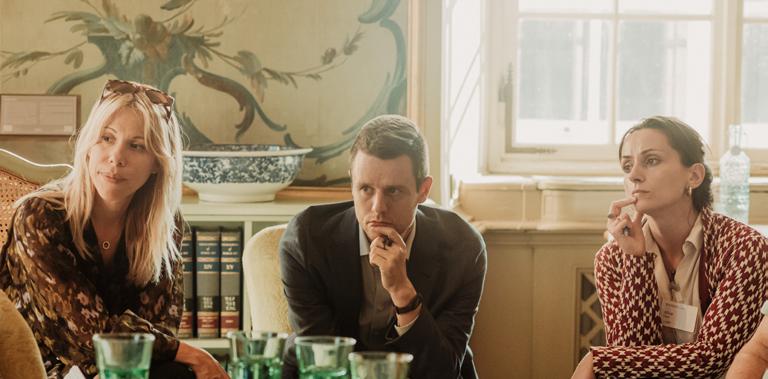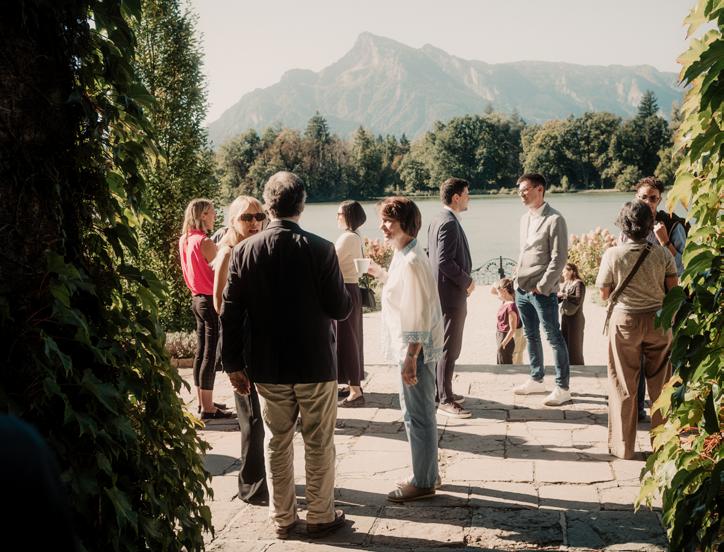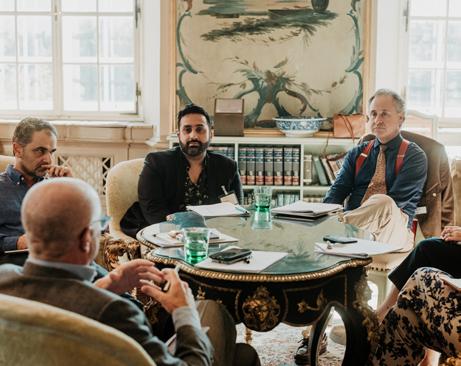
September 17 to 20, 2025
Salzburg, Austria

The following insights and recommendations were crafted during the Salzburg Global American Studies session on “What Next for the U.S.? What Next for America in the World?” held in Salzburg, Austria in September 2025.
Established and emerging leaders from civil society, academia, government, and the private sector met over multiple days to assess how recent events may impact the future of democracy in America and its place in the world in the next 10 to 15 years.
The program was intended to be a forward-looking, forthright, and substantive dialogue, featuring divergent and non-standard views, as well as the views of next generation leaders. We wanted to look over the horizon beyond the current debates to have forthright conversations. The program was off-the-record and held under the Chatham House rule, at Salzburg Global’s home, Schloss Leopoldskron, in Salzburg, Austria.
Many Fellows identified critical opportunities for holding elected officials accountable, reforming the justice system, rethinking the role of the corporate sector, reorganizing the (social) media ecosystem, supporting international exchange in U.S. higher education, and securing America’s role in the international block of Western-liberal states.
Opinions expressed here do not necessarily represent the opinions of all participating Fellows, nor of their institutions, nor of Salzburg Global.
1 Holding Elected Officials Accountable: Changing Incentives and Political Culture
Many elected officials in the U.S. do not appear to be accountable to their electorate. Re-election rates to Congress are often above 90% and have reached 98% in some years. Elected officials are becoming increasingly insulated from their constituents by refusing to engage with them, e.g. at town halls. Moreover, mechanisms like gerrymandering and the massive amounts of (often anonymous) money in politics are unfairly protecting incumbents. The incentive structure for raising money involves candidates being polarizing and bombastic to garner media coverage, which in turn galvanizes the small percentage of committed individuals willing to donate money to these campaigns. Some Fellows consider it vital that accountability be improved by changing incentives and rehabilitating political culture.
Recommendations:
• Implement electoral reforms which reduce the influence of politicians in power, such as open primary elections and independent redistricting commissions
• Utilize transparency dashboards that chart metrics like the number of town halls and meetings with lobbyists and regular citizens
• Neutralize the impact of big money in politics by placing pressure on politicians to disclose campaign contributions more quickly than required and report whose money they do not accept. Some Fellows believe politicians should unilaterally disarm by refusing to play the money game.
• Increase the involvement of everyday citizens in campaigns, starting at the local level, to force elected officials to be responsive and held accountable
• Realize cultural change by investing in growth opportunities in politics (including within political parties) for millennials and Gen-Z and through forms of national service for young people
Justice Reform: Prevention, Community, Narratives
Public understanding of crime and the justice system is often shaped by media and political narratives rather than data. Conditions like homelessness, mental illness, and visible poverty tend to be perceived or mislabeled as criminal threats. Worse, criminal justice policies are being increasingly weaponized or manipulated to fuel fear or gain partisan favor. Moreover, trust in and respect for police have eroded in many communities, leading to staffing shortages, tension between police officers and their communities, and reduced effectiveness in preventing and solving crimes. Although violent crime as a whole is steadily decreasing in the U.S., some communities with higher levels of violence actually support more police presence, rooted in the communities. Numerous Fellows believe it is important to invest in systems of prevention, to center communities, and to change narratives around criminal behavior.
Recommendations:
• Prevent people from being criminalized through measures like increased education and the passage of common-sense gun laws
• Curb big government and restore sensible levels of local autonomy: Communities are best equipped to address their own public safety needs, and safeguards should be in place to prevent federal intervention unless expressly requested by local governments
• Build evidence-based narratives to counter misconceptions about crime and the justice system

3
The Corporate Sector: Leadership for Stability
Corporations are operating in an increasingly uncertain space due to a lack of clear and consistent oversight. On the one hand, the resources and capabilities of some corporations have come to rival or overtake those of many countries. Charismatic corporate leaders, especially in the tech sector, have come to dominate for personal and economic benefit, and they use their money to sway policy and regulation. On the other hand, corporations have become subject to government interference with no legal basis; even the powerful occasionally see their interests overridden by populist demands. The result is regulatory uncertainty and volatility with little respect for precedent, requiring the corporate sector to rethink how to withstand interference and stay on-mission. Moreover, corporations may be pressured into taking political stands by activist investors and dissenting staff. While conflict needs to be recognized, corporations should continue to set long-term, non-political goals and actively shape organizational culture as a unifying force. Many Fellows deem it important for those running corporations to step up as leaders because leadership elsewhere is falling away.
Recommendations:
• Ensure corporate leadership picks a direction to enable their respective organization to set their own business priorities
• Employ written, long-term strategies and sets of corporate principles to create internal coherence and enable a corporation to explain to government that overreaching demands cannot be met
• Allow entities seeking to list and falling under the same parent company to buy each other’s shares at equal rates in order to protect themselves from activist investors
• View long-term stock exchanges as alternative vehicles that induce stability for listed companies
Recentering the Information Function of (Social) Media
Media companies are increasingly co-opted by profit-seeking and other goals that diverge from their main objective of informing citizens through news and analysis. Many are vulnerable to partisan pressures, and their “big business model” incorporates incentives based on ratings and consumer interactions and retention. What is required is a renewed sense of public service in media which takes its role seriously as an impartial observer in a functioning democracy. Social media are subject to similar pressures as well as weaponization by certain groups. Social media companies also use detailed knowledge of brain development and psychology to make their platforms addictive, often fomenting anger, hatred, and polarization in the process. Many Fellows believe that people should be educated on the dangers of social media platforms and that incentive structures be redesigned.
Recommendations:
• Revitalize local journalism by regionalizing, transitioning to onlineonly models, and purchasing data centers. Membership-based models can stabilize income streams while allowing communities to give input on what themes and topics to cover
• Use public health campaigns on social media to warn people of risks and dangers. Involve youth to effectively change narratives and engagement
• Create safety recommendations concerning social media or antiauthoritarian toolkits to warn people about the underlying interests of platforms and the information shared on them
• Make social media algorithms public so that regulation is possible
• Incentivize civil disagreement on social media through algorithms, e.g. by creating a token for nuance and critical thinking
• Empower schools to create a shift in norms around the use of social media. Banning cell phones from schoolgrounds can aid in reducing social media dependency among young people
• Cultivate community moderators to help counter rage bait by giving them the tools to redirect conversations to healthier interactions
Supporting U.S. Academia through Grassroots International Exchange U.S.-based universities are under pressure academically and financially; academic freedom and mobility are under scrutiny. Existing structures supporting international exchanges are being weakened and funding for scholarships on both student and faculty levels is being severely cut. Within universities, support for international studies and language studies is also being cut, and there is a steep downward trend in the number of students studying languages other than English. Moreover, visa restrictions are impacting the flow of foreign students into the U.S. and as a result, fewer American students encounter different cultures and diverse viewpoints. A healthy democracy needs educated, well-rounded citizens with an international outlook at all levels. Some Fellows outlined a goal of creating small-scale opportunities for international exchange that may be implemented at all education levels and across communities. Key to this is using personal connections and existing knowledge and resources to foster exchanges, remaining ready to intensify collaboration when circumstances change.

Recommendations:
• Create a sense of urgency among friendly nations and promote action to reach out to young people and faculty in the U.S. in daily conversations
• Foster initiatives that promote exchanges which follow a format based on the following principles: Informal and approachable; In person, if possible and virtual, if necessary
• Encourage educators to build virtual exchanges into planned activities, including by comparing notes with colleagues abroad during the semester
• Increase regular, virtual exchanges among youth on topics related to their community (sports clubs, fire fighters, music groups, gamers, etc.), including by using sister city connections
• Maintain existing exchanges within apprenticeship programs and encourage their regularization and expansion. Encourage companies to lean into the current administration’s interest in supporting trade schools and to seek funding for in-person exchange in that context

The U.S. and the World Order: Upholding the Western-Liberal Block
The world is transitioning from a predominantly unipolar order to a more multipolar one. At the same time, the nature of sovereignty and foreign policy is changing: value- and norm-based interaction is being replaced by blunt assertions of national interest. Looking ahead to the next 10-15 years, many Fellows consider it crucial that a Western-liberal geopolitical block remains steady in a more fragmented world. Yet much uncertainty exists regarding the U.S.’s internal political future and how foreign policy will be shaped. Some Fellows therefore asked how liberal allies should respond to America’s current posture and prepare for different scenarios of U.S. engagement with the world, i.e. the U.S. as the leader of, a participant in, or a disrupter to the Western-liberal block.
Recommendations:
• U.S. allies should reduce their economic and security dependencies on the U.S. By creating and coordinating alternative opportunities amongst themselves, allies can become less exposed to U.S. foreign policy upheavals and help shift the center of the global liberal block over time.
• Lean into the U.S.’s current preference for bilateral or plurilateral meetings and summits, including the G7 or G20 formats, which are likely to remain effective, alternative ways of engaging the U.S. diplomatically
• Given the recent volatility demonstrated by U.S. engagement with the world, which has been difficult to navigate, U.S. allies should convince Washington to send clear signals, keep its word, and make its commitments unequivocal.
• The European Union might project its own liberal, online soft power as a source of influence and inspiration, and through keeping exchange open.
• Reform the international organizational architecture (internal organization, financing, decision making), including the UN and NATO, before creating entirely new organizations


